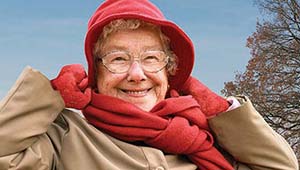Cold Weather Safety for Older Adults

If you are like most people, you feel cold every now and then during the winter. What you may not know is that just being really cold can make you very sick.
Older adults can lose body heat fast—faster than when they were young. Changes in your body that come with aging can make it harder for you to be aware of getting cold. A big chill can turn into a dangerous problem before an older person even knows what’s happening. Doctors call this serious problem hypothermia.
What Is Hypothermia?
Hypothermia is what happens when your body temperature gets very low. For an older person, a body temperature of 95°F or lower can cause many health problems, such as a heart attack, kidney problems, liver damage, or worse.
Being outside in the cold, or even being in a very cold house, can lead to hypothermia. Try to stay away from cold places, and pay attention to how cold it is where you are. You can take steps to lower your chance of getting hypothermia.
Keep Warm Inside
Living in a cold house, apartment, or other building can cause hypothermia. In fact, hypothermia can happen to someone in a nursing home or group facility if the rooms are not kept warm enough. If someone you know is in a group facility, pay attention to the inside temperature and to whether that person is dressed warmly enough.
People who are sick may have special problems keeping warm. Do not let it get too cold inside and dress warmly. Even if you keep your temperature between 60°F and 65°F, your home or apartment may not be warm enough to keep you safe. This is a special problem if you live alone because there is no one else to feel the chilliness of the house or notice if you are having symptoms of hypothermia.
Here are some tips for keeping warm while you’re inside:
• Set your heat to at least 68–70°F. To save on heating bills, close off rooms you are not using. Close the vents and shut the doors in these rooms, and keep the basement door closed. Place a rolled towel in front of all doors to keep out drafts.
• Make sure your house isn’t losing heat through windows. Keep your blinds and curtains closed. If you have gaps around the windows, try using weather stripping or caulk to keep the cold air out.
• Dress warmly on cold days even if you are staying in the house. Throw a blanket over your legs. Wear socks and slippers.
• When you go to sleep, wear long underwear under your pajamas, and use extra covers. Wear a cap or hat.
• Make sure you eat enough food to keep up your weight. If you don’t eat well, you might have less fat under your skin. Body fat helps you to stay warm.
• Drink alcohol moderately, if at all. Alcoholic drinks can make you lose body heat.
• Ask family or friends to check on you during cold weather. If a power outage leaves you without heat, try to stay with a relative or friend.
For tips on keeping warm while you’re inside, as well as additional cold weather safety information for seniors, from the National Institute on Aging, CLICK HERE.
